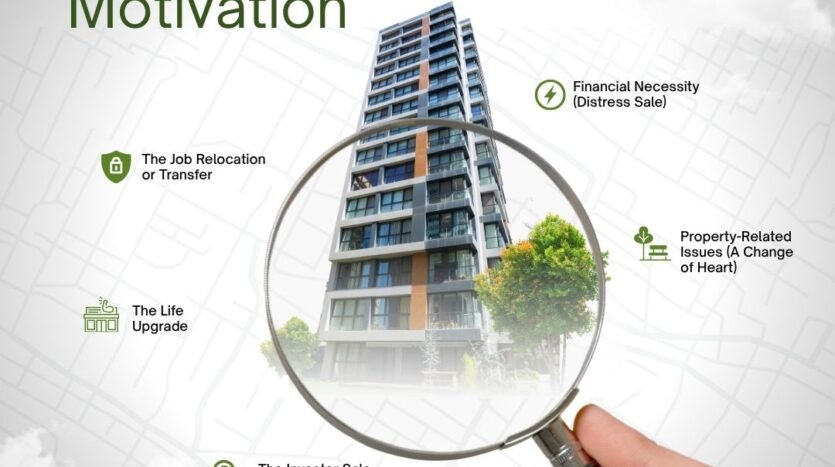Seller’s Motivation is the Buyer’s Secret Weapon 🗝️

Decoding the Sale: Why Understanding a Seller’s Motivation is the Buyer’s Secret Weapon 🗝️
When you’re buying a property, your focus is naturally on the house itself: the floor plan, the kitchen, and the location. But there’s a vital, often-overlooked factor that can determine your negotiation power, the final price, and the speed of the closing: the seller’s reason for leaving.
Before you make an offer, you must become a detective and figure out the “Why” behind the listing. Here’s a breakdown of the common reasons people sell and why every buyer must consider these points before purchasing.
The Top 5 Reasons People Sell Property
The seller’s motivation is rarely about finding the perfect buyer; it’s almost always about resolving a personal or financial necessity. These reasons can be grouped into five major categories:
1. The Life Upgrade/Change (Upsizing or Downsizing)
- The Reason: The family is growing and needs more space (upsizing), or the children have moved out, and the owners want a smaller, easier-to-maintain home (downsizing). They may also be relocating closer to family or a specific school.
- The Buyer’s Takeaway: This is usually a low-urgency sale. The seller is moving for lifestyle, not desperation. They are likely to be firm on price and willing to wait for the highest offer. Your negotiation leverage will be minimal, and you’ll need to make a competitive offer focused on price.
2. The Job Relocation or Transfer
- The Reason: The seller has accepted a new job in a different city, or their company is transferring them.
- The Buyer’s Takeaway: This is a high-urgency sale due to a fixed timeline. The seller is typically highly motivated to close quickly to avoid the financial strain of paying two mortgages simultaneously. Buyers can often use this urgency to negotiate a lower price, ask for concessions (like covering closing costs), or request a quicker closing date, which can be as valuable as a price reduction.
3. Financial Necessity (Distress Sale)
- The Reason: The seller is facing serious financial hardship, such as job loss, unmanageable debt, divorce, or is in danger of foreclosure.
- The Buyer’s Takeaway: This is the highest-urgency, most-motivated sale. The seller needs cash and speed above all else. This scenario offers maximum negotiation leverage for a buyer. You may secure the property at a significant discount, but be prepared for the seller to prioritize a quick, all-cash, or non-contingent offer, and be less willing to pay for repairs.
4. Property-Related Issues (A Change of Heart)
- The Reason: The seller is tired of a long commute, the neighborhood has changed (e.g., too noisy, commercialization), or they can no longer afford the maintenance on an older home. They might also be selling an inherited property they never intended to keep.
- The Buyer’s Takeaway: Be cautious. If the seller is leaving due to a neighborhood issue or high maintenance costs, you need to conduct extra due diligence. Use the home inspection to rigorously check for deferred maintenance the seller may be fleeing.
5. The Investor Sale (Realizing ROI)
The Buyer’s Takeaway: This is an emotionless transaction. Negotiations will be purely pragmatic and based on data. The seller will have a strict minimum price, and you should use a Comparative Market Analysis (CMA) to counter with a data-driven offer. They will prioritize clean, fast closings over sentiment.
The Reason: The seller is a property investor or flipper whose only goal is to realize their Return on Investment (ROI).
Why Every Buyer Must Consider These Points
Understanding the seller’s ‘why’ is not just gossip; it’s your negotiation intelligence. It affects three core elements of the transaction:
1. It Defines Your Negotiation Leverage
- High Motivation = High Leverage: A seller relocating for work (Reason 2) is often willing to sacrifice ₹10,000 on the sale price to save ₹20,000 in double loan payments. Their need for speed is your power.
- Low Motivation = Low Leverage: A downsizer (Reason 1) may reject a good offer simply because they don’t have to sell right now. Your offer must be impeccable on price and terms.
2. It Helps You Write a Winning Offer
Money isn’t always the top priority. You can tailor your offer to appeal to their specific need:
| Seller Motivation | Seller’s Priority | Buyer’s Winning Strategy |
| Relocation (Need to move quickly) | Speed and certainty. | Offer a quick closing (21-30 days) and minimize contingencies. |
| Financial Distress (Foreclosure risk) | Cash and immediate relief. | Offer a cash deal (if possible) or a very strong earnest money deposit. |
| Downsizing (Low urgency) | Maximum profit. | Offer the highest possible price and be extremely flexible on the closing date. |
3. It Guards Against Future Regret
If your agent finds that the seller is moving because of rising local crime rates or a major structural defect they can’t afford to fix, you’ve been given a valuable warning sign. By questioning the motivation, you either uncover a hidden liability or confirm that the reason is purely personal (like a new job), giving you confidence in your purchase.
In summary, the secret to a successful home purchase is simple: stop focusing only on the property and start focusing on the person selling it. Knowledge of their motive is the difference between getting a good deal and overpaying.





